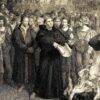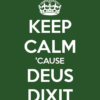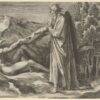Tag: Theology
Theology as Discipleship
Be diligent to present yourself approved to God as a workman who does not need to be ashamed, accurately handling the word of truth. –II Timothy 2.15 For a long time, I’ve thought of reading and doing theology as an act of sanctification and discipleship. How else is the Christian supposed to act rightly (orthopraxis) without knowing rightly (orthodoxy)? These are bound together in a dialectical bundle whilst the one implicates the other, and vice versa. In short: without the work of prayerful and worshipful study before God there cannot be any Christian growth. When the disciple does a word…
The Early Aristotelianization of Reformed and Lutheran Theology
Barth on the stillbirth of the Protestant Reformation. He underscores a reality that I have been, we have been writing about for years, in regard to the scholasticism Reformed and Lutheran. That is to note, the reception of the Aristotelian mantle that had, ironically, brought to formation the very Church, and her doctrina, that Luther was seeking to reform. Unfortunately, very early on in the second and third generation reformers (on both the Reformed and Lutheran sides) imbibed the theological categories that had originally led to the status of the Roman Church that Luther and others believed needed to be…
Philosophy of Religion and Christian Theology in Combine
More thoughts on the properties of God for my philosophy of religion class. As I have been responding, this week, surrounding God’s omniscience, freedom, goodness, and necessity. These are my first two responses. “Could anyone other than you, right here and now, know what it was like to be you, right here and now? Why or why not? What are the implications of your answer for the notion of divine omniscience?” (this, posed by the tutor for the class, based on our readings of T.J. Mawson) Omniscience. Someone might have the capacity to know what it is like to be…
In the Rut of General Theism: Against Neutral Theology
Christians don’t believe in an abstract ethereal god. Christians believe in the triune God who has Self-revealed Himself in Jesus Christ. Period. This should be an unremarkable assertion. There should be zero pushback to this. But in the so-called Great Tradition of the Church, and those who are ostensibly “retrieving” it, this isn’t the case. Classical theism, so-called, as a contemporary way to identify certain expressions of the antique past, especially with reference to a theology proper, have so synthesized, say, the Aristotelian categories with an ecclesiastical doctrine of God, that it is nay impossible to make a distinction, in…
A Brief Sketch on a Theology of Pets and Animals
Should I not have compassion on Nineveh, the great city in which there are more than 120,000 persons who do not know the difference between their right and left hand, as well as many animals?” –Jonah 4:11 Animals have become too humanized. They deserve respect, care, and love, indeed. They serve as companions, and as a source of comfort and release (and sometimes terror). But at the end of the day, they aren’t human beings. They have their rightful place in an “order of being,” but that order cannot (should not) supplant the value of a human being vis a vis God. I’m not suggesting…
‘The older Protestant theology was right to treat Aristotle as an adversary’
There has been a resurgence, among Protestants, either towards affirming the classical theism of Thomas Aquinas (i.e., Christian-Catholic theology synthesized with Aristotelian categories) or rejecting it.[1] But even those, in the broader Reformed world who ostensibly reject it, still affirm it; insofar, that they operate with the philosophical-theological categories provided for by said Thomistic synthesis. I have, for decades now, been calling this Thomistic-Aristotelian mode of Reformed theology out. And yet, that machine will never really bust. It has tentacles reaching into the far reaches of the Christian world at this point. In the West, in particular, it has publishing…
An Apology for Reading Deep Theology, Beyond Nerdom
This is no secret: I read lots of what would be considered “academic theology.” The thing is, I don’t read it to be an academic, per se. The thought occurs to me that there are many out there who read and do theology for purely academic reasons. But you don’t have to. You can read academic theology simply to grow in the grace and knowledge of Jesus Christ; to be active in the sanctification process, as the Holy Spirit blows and kindles the fire of Christ’s love upon our new hearts of ‘flesh.’ It is true, some might mistake you…
On Being the Listening Church: How Dialectical Theology, Properly Understood, is Dialogical Theology
What is dialectical theology? Barth is often referred to as a dialectical theologian; especially the earlier Barth. Some want to implicitly criticize Barth by asserting that because Barth was a dialectical theologian, he, eo ipso was a Hegelianizing theologian (i.e., putting Hegel’s dialectic to work for his theologizing). And yet, Barth is much more original than that. He was clearly a modern theologian, as is anyone who currently does theology in the 21st century. Even so, his methodology was to allow Holy Scripture and its reality in Jesus Christ to regulate his deployment of any other mechanisms he might have…
**TOMORROW** Free Class: Indigenous Thought & Theology
Class: Indigenous Thought & Theology Indian people have unique and beautiful ways of understanding the world. Indigenous wisdom – as it relates to living in relationship with the Creator, Mother Earth and other created beings – should be centered if we want to provide better care for our home and all our relatives. Indigenous Thought & Theology introduces participants to this wisdom and examines Indigenous ways of understanding, respecting and interacting with this wondrous world we inhabit. No pre-registration is required to participate. Just click “join the class” to attend. Thursday, Oct. 24, 2024 Class: Indigenous Thought & Theology 2…
The Spoken Word of God Theology for Us: On a Dialogical Theology
Dialogical theology. It is one of our theses we put forward in our first Evangelical Calvinism book. What is it; what are its entailments; and why am I such a strong proponent of it? In nuce, dialogical theology is exactly what it sounds like: it is a theological “method” that allows the object of theology, who is also Subject for us, to confront us, to speak to us first that we might speak to Him; that we might come to know Him as He knows Himself from a center in Himself for us in Jesus Christ. So, this approach, this…






